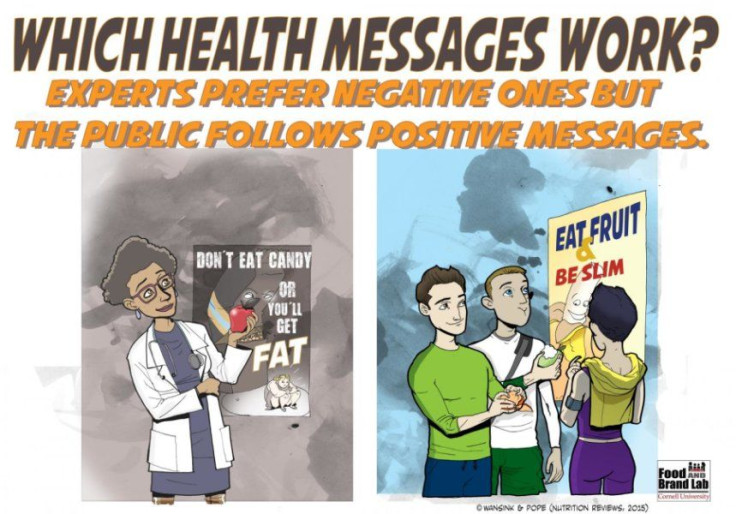Weight Loss Goals Are Easier To Achieve With A 'Do' Attitude Rather Than A 'Don't'

By now, we all know that fat shaming is an ineffective strategy when it comes to weight loss. It could be that putting a negative connotation on any public health message is impractical. A recent study conducted at the Cornell Food & Brand Lab has found that instead of telling a loved one what they can’t eat if they want to avoid weight gain, you should tell them what they can eat to stay healthy. Unless, of course, that person is a dietician or physician.
"If you're a parent, it's better to focus on the benefits of broccoli and not the harms of hamburgers," Dr. Brian Wansink, director of the Cornell Food and Brand Lab and author of Slim by Design, said in a statement.
Wansink and his colleagues combed through 43 published international studies dealing both positive and negative messages regarding nutrition. Although negative messages did work best among dieticians, physicians, and other experts in the field of nutrition, people without any expert knowledge on nutrition didn’t respond so well to negativity. Instead of telling them what they shouldn’t eat and why they shouldn’t eat it, most people would rather hear what they should eat and why they should eat it.
The research team concluded that public health messages should be designed around positive consequences that are more effective among the general public with no expert knowledge on nutrition as opposed to negative consequences. That isn’t to say certain public health groups don't already focus on the positive consequences of nutrition. Both the American Heart Association and the Centers for Disease Control and Prevention use the message “Eat More Fruits and Vegetables” in their public health messages.
According to the CDC, essential vitamins, minerals, and fiber found in fruits and vegetables will not only help you maintain a healthy weight or lose weight, but can also protect against chronic disease, such as stroke and certain types of cancer. The AHA recommends filling at least half of your plate with fruits and vegetables to account for the four to five servings recommended each day. As the United States continues to battle its own obesity epidemic, finding the most efficient public message has become paramount in helping Americans help themselves.
Source: Wansink B, et al. Which Health Messages Work Best? Experts Prefer Fear-or-Loss Related Messages, but the Public Follows Positive Grain-related Ones. Society of Nutrition Education and Behavior's Annual Conference. 2015.



























